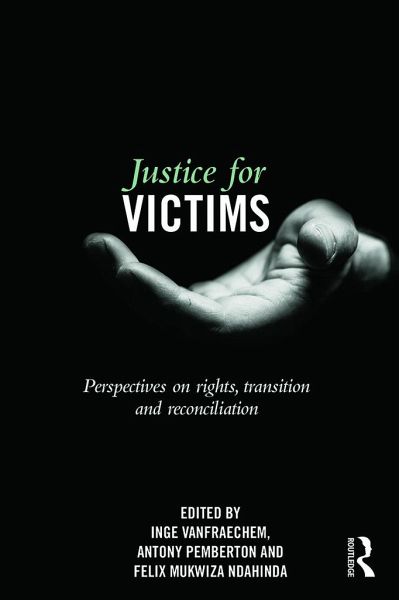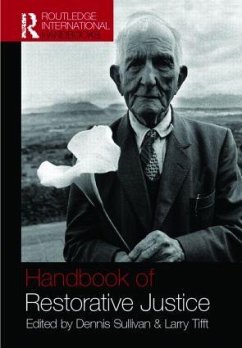
Gebundenes Buch
Justice for Victims
Perspectives on rights, transition and reconciliation
Herausgeber: Vanfraechem, Inge; Ndahinda, Felix; Pemberton, Antony
Versandkostenfrei!
Versandfertig in 1-2 Wochen

PAYBACK Punkte
133 °P sammeln!




This book brings together an international collection of exemplary scholars to offer a state-of-the art overview of the current study of victims of crime, combining both legal and social scientific perspectives and articulating both in bold new directions.
Inge Vanfraechem, Ph.D., is manager of the European FP7 ALTERNATIVE project and works at the KU Leuven, where she received her B.A., M.A. and Ph.D in criminology (2006) on the implementation of family group conferencing in Belgium, a path-breaking approach to the restorative justice field in Europe. She has worked as researcher and co-promoter on the Evaluation of Victim Policy in Belgium at the National Institute of Criminal Sciences and Criminology (NICC) at the Belgian Ministry of Justice during 2007-2010. Dr. Vanfraechem returned to the KU Leuven Institute of Criminology in 2011 to work as coordinator and co-promoter of several interdisciplinary and collaborative European projects for the European Forum for Restorative Justice (EFRJ) and Leuven Institute of Criminology (LINC), such as: Victims and restorative justice, Conferencing: a way forward for Europe, and Restorative Justice and Crime Prevention. She is editor of 'Restorative Justice: an International Journal', the only peer-reviewed, high standard, academic and international journal in the field of restorative justice. Dr. Vanfraechem is also a key member of the Working Group on Victimology of the European Society of Criminology (ESC). Antony Pemberton, PhD., is Associate Professor and Director of Studies at the International Victimology Institute Tilburg (INTERVICT) in the Netherlands. He has published more than 60 articles, books and book chapters on victimological subjects, with a particular emphasis on victims in justice processes. Dr. Pemberton has previously co-authored a book on victims of terrorism, (Assisting victims of terrorism, 2010), co-edited a volume on victims of international crimes (Victimological approaches to international crimes: Africa, 2011) and has also published a series of articles applying concepts from social and clinical psychology to victimology (included in The cross-over: an interdisciplinary approach to the study of victims of crime. 2010). More information can be found at http://www.tilburguniversity.edu/webwijs/show/?uid=a.pemberton. Felix Mukwiza Ndahinda is an Assistant Professor at Tilburg Law School's International Victimology Institute Tilburg (INTERVICT - Tilburg University - the Netherlands) and he is also the coordinator for the Masters in Victimology and Criminal Justice at Tilburg law School. He holds a PhD from Tilburg University (2009); an LLM from the Raoul Wallenberg Institute of Human Rights (Sweden-2006) and a Bachelor's degree (LLB.) from the National University of Rwanda (2003). Dr. Ndahinda previously worked for the International Criminal Tribunal for Rwanda in Arusha-Tanzania (2003 and 2009) and for the Office of the Auditor General for State Finances in Rwanda (2004). He has also worked as a consultant for the United Nations High Commissioner for Human Rights and produced a report on Human rights and issues related to terrorist hostage-taking. His academic interests cover transitional Justice, ethnicity, minority and indigenous issues. Among others, he published Indigenousness in Africa: A Contested Legal Framework for Empowerment of 'Marginalized' Communities (Asser Press/Springer, 2011).
Produktdetails
- Verlag: Routledge
- Seitenzahl: 428
- Erscheinungstermin: 17. Juni 2014
- Englisch
- Abmessung: 240mm x 161mm x 27mm
- Gewicht: 804g
- ISBN-13: 9780415634335
- ISBN-10: 0415634334
- Artikelnr.: 40140745
Herstellerkennzeichnung
Libri GmbH
Europaallee 1
36244 Bad Hersfeld
gpsr@libri.de
Für dieses Produkt wurde noch keine Bewertung abgegeben. Wir würden uns sehr freuen, wenn du die erste Bewertung schreibst!
Eine Bewertung schreiben
Eine Bewertung schreiben
Andere Kunden interessierten sich für













